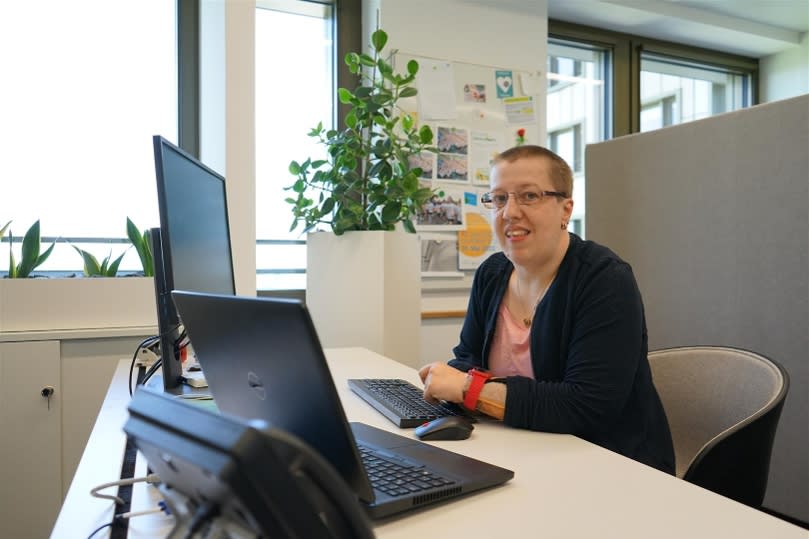Diverstiy, Equity & Inclusion
"The biggest barriers are in people's minds"

Focus on inclusion: Katja Dittmann (42) has lived with spastic tetraparesis, a movement disorder caused by damage to the brain and spinal cord, since birth. The trained office worker works at the Pfennigparade Foundation and has been doing an internship in the HR department at BayWa headquarters since the beginning of May: she wants to use the six months to get to know the corporate world. A conversation about putting aside prejudices, accessibility and the courage to start something new.
How do you talk about your illness? As a handicap?
Katja Dittmann: I personally speak of a disability, that's the clearest way for me.
What motivated you to go into the private sector?
I wanted a change of scenery. I've been working at Pfennigparade for 20 years and we all have a disability there. Mine is that my speech is sometimes slurred and my movements are restricted. There is often only one issue when many people with disabilities are in one place: What all is not possible. But I think that's wrong, because so much is still possible. I wanted to try something different, to venture into the open labor market. I'm glad to have the chance to prove myself in this six-month period and to be able to develop further. With the tasks I am now taking on, I can improve my IT skills even further and also get to know new people.
What experience have you gained at BayWa so far?
People approach me very openly - and I do the same: I always say when I first meet them: “If I speak too clearly and you don't understand me, please feel free to ask.” It's not rude, this openness is so important for our interaction. No matter who I've already met here: I have been warmly welcomed by everyone.
What about accessibility?
I was surprised at how well BayWa is set up. I can move around freely here in my wheelchair as far as possible. It's little things like the touchscreen on the elevator that make everyday life so much easier for me. But to go to the toilet, I have to go to the first floor or the 20th floor. There are the only two disabled toilets in the building. That's a bit of a journey for me, because I work on the ninth floor. Generally speaking, people are very helpful. Of course, accessibility is important, but interpersonal interaction is even more important. The biggest barriers are in people's heads.
What experiences have shaped you in your life?
I grew up in Leipzig, back then it was a different time. There was no trace of the openness that I experience today. In Leipzig, it often felt as if disabled people were aliens, not really part of society. I remember a situation when I was at the train station in my home country with my partner: we actually just wanted to ask a small group a question. Instead of answering, they turned around, laughed and made fun of my way of speaking. That was 20 years ago now, but it's hard to forget.
Where do you get your courage to tackle things?
From an early age, I had to go to kindergarten, which was far away from home. As a child, I went to boarding school during the week, to a school for the physically disabled. I was only at home at the weekend. I often felt lonely. But as an adult, I see things differently: it taught me independence.
Over 20 years ago, I completed my IHK training as an office worker at the Spastikerzentrum in Munich. I was immediately captivated by the city and its open-minded people. I liked it so much that I wanted to stay here. My parents said to me at the time: “You're crazy. How are you supposed to live independently in Munich?” But I believed in myself. Now I have a job, my own apartment and live with my spouse, who I met during my training. In short: I have a good life in my adopted country.
What hurdles do you sometimes face - including at BayWa?
For me personally, the English terms are difficult, almost everyone here has an English title, it seems to me - and “Denglish” is also often spoken in conversations. But I'm learning the ropes. The work in the Group is demanding, of course I want to appear very serious. I can imagine that many other people in my position would find it difficult in a job like this.
Some also have behavioral problems due to their disability, speak very loudly or don't know when they should perhaps keep quiet. So you couldn't just barge into an important meeting and disrupt it. I think that people still experience different levels of acceptance in society, depending on their degree of disability - unfortunately.
What plans do you have for the future?
My greatest wish is to gain a foothold with a large company, albeit as a kind of temporary worker. I will continue to pursue this goal. BayWa has already enabled me to take the first step.

